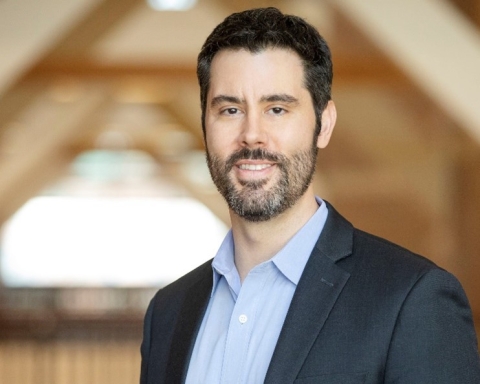
Date:
Location:
Speaker:
Abstract:
Solvent molecules surround and interact with catalytic sites in ways that change reaction rates and selectivities by orders of magnitude. While the importance of solvent effects on organic chemistry is established and heuristics exist for homogeneous systems, interactions among solvent molecules and reactive species remain challenging to describe molecularly especially at surfaces. This seminar will share insight from select examples that include the production of H2O2 and its use for epoxidations: both are reactions needed to reduce environmental impact (CO2 emissions, chlorine use) of chemical manufacturing.
During reactions between H2 and O2 on metal nanoparticles, organic solvents spontaneously form surface redox mediators that co-catalyze proton-electron transfer steps and influence the active phase of the catalyst nanoparticle. In water, nanoparticles catalyze heterolytic hydrogen oxidation and oxygen reduction reactions on individual nanoparticles, analogous to electrochemical fuel cells, that demonstrate fundamental connections between electro- and thermocatalytic processes for this chemistry. Within zeolite pores, the catalytic epoxidation of alkenes at framework Ti-atoms exhibit rates and selectivities that depend on dimensions and polarity of surrounding voids. As a consequence, rates and selectivities span by 102-103 fold at active sites with indistinguishable electronic structure. These results indicate the topology of the catalyst changes the structure of the solvation shells that form about reactive species and evolve along with the reactants. Coupled kinetic and spectroscopic analysis provide insight to individually weak but collectively significant interactions between catalyst surfaces, solvating molecules, and reactive species that offer principles to design solid-liquid interfaces for catalysis. Taken together, these discoveries provide guidance for improved catalysts and processes for oxidative valorization of hydrocarbons and renewable feedstocks.
Bio:
David Flaherty is the Dow Chemical Company Faculty Scholar and Associate Professor of Chemical and Biomolecular Engineering at the University of Illinois, Urbana-Champaign. He leads a group that develops understanding and design principles for the use of solid catalysts to resolve challenges for the sustainable production of chemicals and energy carriers. Research focuses on generating new insight to the chemical phenomena that emerge when reactions occur on complex and dynamic catalyst, often solid-liquid interfaces. Knowledge of these systems comes from use of kinetic, spectroscopic, synthetic, and computational perspectives intended to develop principles needed to harness diverse chemical interactions. Prof. Flaherty received the Department of Energy Early Career Award; National Science Foundation CAREER Award; the American Vacuum Society, Early Career Research Award; and the Dean’s Award for Research Excellence at Illinois. In 2021, he was selected as an Eastman Foundation Distinguished Lecturer in Catalysis at the University of California, Berkeley. Flaherty recently served as program chair for the 26th North American Catalysis Society Meeting; program chair and secretary of the ACS CATL Division, and on the Early Career Advisory Board of ACS Catalysis. At Illinois, he has been named seven times to the list of “Excellent Teachers” and received the Excellence in Teaching Award from the School of Chemical Sciences.



